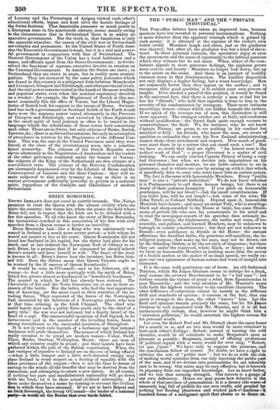BRIEN BOROIMHE.
YOUNG IRELAND does not excel in courtly inuendo. The Nation promises to treat the Queen with the utmost civility when she visits the country; but warns her, when she passes the field where Brien fell, not to expect that the Irish are to be deluded with a few fair speeches. To all who know the story of Brien Boroimhe the insinuation couched in this association of his fate with civil speeches from a Queen seems to border on incivility.
Brien Beroimhe had—like a King who was rapturously wel- oomed in Ireland at a much more recent period—a wife whom he would not permit to live at his court. Queen Kormlaudu did not beard her husband in his capital, but she thrice laid plots for his death, and at last induced the Norwegian Earl of Orkney to at- tack Brien, by a promise that if he conquered he should inherit Brien's sceptre and have herself to wife. The finale of the story is known to all : Brien's forces beat the invaders, but Brien him- self fell. Does the Nation mean that Queen Victoria ought to be warned by the ill success of Queen Kormlaudu
It would be wise in O'Connell—and in his followers, old or young—to deal a little more sparingly with the myth of Brien, which has grown almost as hackneyed as "hereditary bondsmen." The quarrel in which he fell has already been noticed. The Chronicles of Eri and the Norse historians are at one in their ac- counts of the battle. But the latter, who had the best opportuni- ties of knowing, are the more exact in their statistics of the in- vading forces. They consisted of the forces of the Norwegian Jarl, recruited by the followers of a Norwegian pirate who was at that time cruising in the Irish Channel. The chief who could barely beat such a paltry force could only be the chief of a
tpetty tribe : the war was not national, but a family brawl of the ead of a sept. The unsuccessful incursion of Jarl Sigurd, in its inducement and in the number of the invading forces, bears a strong resemblance to the successful incursion of Strongbow. It is not in such rude legends of a barbarous age that rational Irishmen will pride themselves. The names of which Ireland has really occasion to be proud are modern names—Usher, Swift, Clare, Burke, Grattan, Wellington, Moore : these are men of which any country might be proud ; and their laurels have been gathered within the pale of the British constitution. When the last vestiges of injustice to Ireland are on the eve of being effaced when a little temper and a little well-directed energy may place Ireland in every respect on a footing of equality with the other provinces of the empire—then is not the time to dream of casting. to the winds all the benefits that may be derived from the connexion, and attempting to create a new nation. At all events, if nothing but pure and unadulterated nationality will go down with the Irish, let it be their actual civilized nationality. Let them make themselves a name by turning to account the civiliza- tion to which they have attained. If we are to haire Repeal and an Irish Sovereign, the living O'Connell—the leader of a national petty--is worth all the Brien& dui* ever bards fabled.


























 Previous page
Previous page